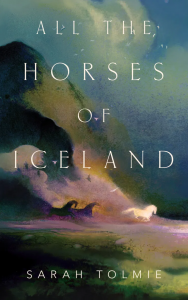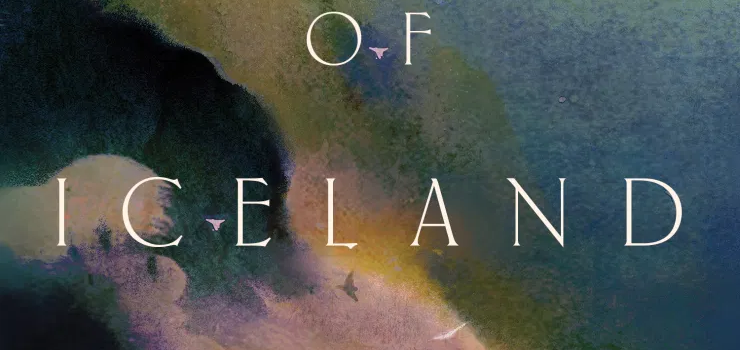Gary K. Wolfe Reviews All the Horses of Iceland by Sarah Tolmie
 All the Horses of Iceland, Sarah Tolmie (Tordotcom 978-1-250-80793-9, $15.99, 112pp, tp) March 2022.
All the Horses of Iceland, Sarah Tolmie (Tordotcom 978-1-250-80793-9, $15.99, 112pp, tp) March 2022.
Sarah Tolmie’s All the Horses of Iceland might also be described as a concise epic, purporting to describe how horses came to Iceland, but it’s cast more in the form of a chronicle than a plotted tale. Its narrator is a priest named Jor, who is reconstructing from a distance of centuries the story of Eyvind of Eyri, a trader who joins a group of Khazars on a hazardous expedition into Russia, mostly to capture and bring home a group of wild horses. Learning from a Khazar named Joseph (who is a bit too fond of lecturing Eyvind on everything from Khazar governance to grassland agriculture), he finds himself involved in a series of side adventures, the most important of which is his involvement with a family cursed by the ghost of a woman who was descended from “a long line of white magicians.” After helping them exorcise the ghost, he is rewarded with 25 horses, including a ghost-like white Mare with No Name who at times seems invisible to everyone but Eyvind. Much of the rest of the story involves getting the horses safely through a war-torn Russia without their being confiscated by the military, and making it back to Iceland, with an adopted son named Geirr in tow.
Just as Griffith uses old Welsh terms, Tolmie helps create a sense of fantasy-like displacement by using terms from old Norse, Turkish, and Mongolian, though a determined enough reader would likely be able to trace Eyvind’s adventures on a map and track down at least some of her versions of historical figures. No such map is provided, and for good reason: we’re meant to be involved in Jor’s account as a kind of origin myth involving the horses of Iceland, not as a documentary about 9th-century trade routes. Adding to this chronicle effect are interpolated documents such as a contemporary manuscript describing that family haunting (supposedly brought back to Iceland by Eyvind) and a couple of poems, one recited by Eyvind’s adopted son Geirr (whose own rather ribald troubles lend an odd comic tone toward the later parts of the narrative). At times, all this serves to give the story an almost leisurely pace, despite Tolmie’s packing in enough material for a long-winded historical epic. While there are a few passages of dialogue that seem to go on a bit (and feel more novelistic than the other parts of the story), the overall style is at once poetic and sparse, and at times extraordinarily graceful. Although relatively little of the story is set in Iceland itself, it manages to evoke the hypnotic rhythms of the Eddas, and it gracefully balances its meticulous historical detail with a strange and sweeping sense of legend.
Gary K. Wolfe is Emeritus Professor of Humanities at Roosevelt University and a reviewer for Locus magazine since 1991. His reviews have been collected in Soundings (BSFA Award 2006; Hugo nominee), Bearings (Hugo nominee 2011), and Sightings (2011), and his Evaporating Genres: Essays on Fantastic Literature (Wesleyan) received the Locus Award in 2012. Earlier books include The Known and the Unknown: The Iconography of Science Fiction (Eaton Award, 1981), Harlan Ellison: The Edge of Forever (with Ellen Weil, 2002), and David Lindsay (1982). For the Library of America, he edited American Science Fiction: Nine Classic Novels of the 1950s in 2012, with a similar set for the 1960s forthcoming. He has received the Pilgrim Award from the Science Fiction Research Association, the Distinguished Scholarship Award from the International Association for the Fantastic in the Arts, and a Special World Fantasy Award for criticism. His 24-lecture series How Great Science Fiction Works appeared from The Great Courses in 2016. He has received six Hugo nominations, two for his reviews collections and four for The Coode Street Podcast, which he has co-hosted with Jonathan Strahan for more than 300 episodes. He lives in Chicago.
This review and more like it in the March 2022 issue of Locus.
 While you are here, please take a moment to support Locus with a one-time or recurring donation. We rely on reader donations to keep the magazine and site going, and would like to keep the site paywall free, but WE NEED YOUR FINANCIAL SUPPORT to continue quality coverage of the science fiction and fantasy field.
While you are here, please take a moment to support Locus with a one-time or recurring donation. We rely on reader donations to keep the magazine and site going, and would like to keep the site paywall free, but WE NEED YOUR FINANCIAL SUPPORT to continue quality coverage of the science fiction and fantasy field.
©Locus Magazine. Copyrighted material may not be republished without permission of LSFF.








